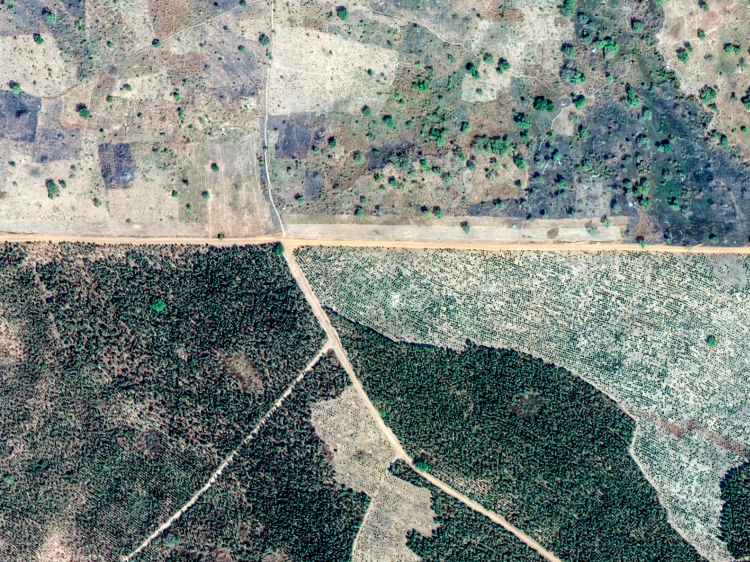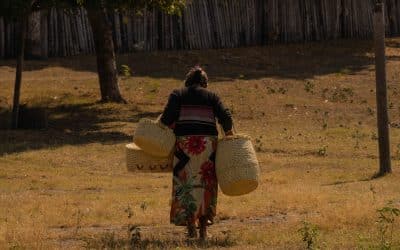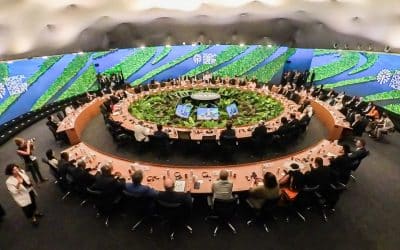Par Gary Graham Hughes, Biofuelwatch, et Souparna Lahiri, Coalition mondiale des forêts
Nous nous dirigeons vers une semaine d’actions intenses pour le climat commençant par la grève du climat et suivie par la Semaine d’action pour le climat du Secrétaire général des Nations Unies, ainsi que de nombreux évènements de la société civile à New York et dans les environs. Nous célébrons aujourd’hui (le 21 septembre) la Journée internationale de la lutte contre les plantations d’arbres en monoculture.
Continuez à lire en anglais…
Adverse impact of climate change is becoming a reality with fast melting Arctic ice, catastrophic floods, drought and unprecedented warming affecting the globe. In continuum to the now regular wild fires of California and Australia, Amazon is burning and forest fires are raging in Indonesia, Congo and Russia.
Millions of hectares of pristine forests, wildlife and natural ecosystems are destroyed. Territories and habitats of indigenous peoples are razed to the ground, environmental defenders are hunted down and killed. And we are struggling to raise our voice for human rights and rights of the Mother Earth.
What are we up to? The climate deniers and the governments in the first world, are sitting tight, whimpering on their pledge to provide $100 billion a year toward assisting those in harms way, while lavishly financing false solutions such as monocultutre trees plantations, offsets and REDD+. Calls for enhanced ambitions and urgent measures, even by the UN Secretary General seems to have evoked a muted response.
Multi-stakeholder climate actions, promoted by the UN and other agencies, have served only to increase the role of corporations, and their associations and consultants in climate negotiations and dialogues. The voices of indigenous peoples and local communities, women and youth among others are largely unheeded with such corporate capture of climate spaces.
Hence, the same fossil fuel industry and the agribusiness companies, largely responsible for the climate crisis and destruction of the life support systems of our planet, will nonetheless have a strong presence at the UN Climate Summit.
An encouraging development in the Climate Summit agenda is the increased attention given to mitigation opportunities in the land sector, called ‘Nature Based Solutions’ (NBS). NBS is one of nine workstreams for the Summit, and one of the most prominent. The NBS should ideally be grounded on ecosystems-based solutions at the community level, leading to climate actions on land and community tenure rights, community governance, restoration, and agroecology. But we are yet to see any commitments emerging out from the NBS team that the workstream will not be held hostage to false solutions and market trading schemes, monocuoture plantations and forestry offsets.
Too much emphasis on restoration and reforestation – in many cases defined as industrial monoculture tree plantations – threatens to deprioritise conservation and protection of forests, biodiversity and eco-systems and, most fundamentally, strong and enforced commitments to ending deforestation.
Will forest restoration commitments mean monoculture tree plantations? There is a difference in the resilience and productivity of healthy, diverse natural forests as compared to regimented, monoculture plantations. The proper metric is not ‘acres of trees planted’, but rather ‘recovery of forest ecosystem function while protecting small scale livelihoods’.
Bio-energy is a false solution. Replacing coal with forests for burning will not only lead to more emission but increased planting of energy crops and trees, marginalising communities and destroying their livelihood. The EU and the US have to give up bio-energy as a potential renewable energy solution.
The imperative of gaining clarity on these questions could not be made more clear than recent events in California. While people from around the world descend on New York City, out on the west coast, a bitter battle was fought in California’s Air Resources Board over the proposed California Tropical Forest Standard. After an extremely contentious hearing at the end of what was highly questionable and skewed public process, California approved a standard for bringing forestry offsets and REDD+ into any number of potential pollution trading systems under the pretense that fossil fuel emissions will be negated by some trees growing elsewhere. In a bizarrely Orwellian fashion, the Air Resources Board claimed that their tropical forest offset scheme is not really about offsets, even as the agency explicitly specified the global aviation sector Carbon Offsetting and Reduciton Scheme for International Aviation (CORSIA) for nearterm utilization of the standard.
This obfuscation of the intent to bring the TFS into the California carbon market was used to defuse opposition from frontline communities most impacted by the permitted pollution of offsets thereby providing free pass to fossil fuel companies in the state by distancing the standard from the extensive support it has received from the immense oil, gas and utility interests in the state.
Against a very strong resistance from Indigenous peoples’, frontline environmental justice, forest groups and civil society, the money power of the World Bank, the United Nations, the government of Norway, and the companies and corporate interests that desire tropical forest offset schemes to greenwash their climate damage, combined with an industry friendly agency to steamroll the public process to minimize evidence and expert testimony and ultimately endorse the standard.
After many years of gritty grassroots resistance to this false solution, the influence of industry and the corpoate NGOs that do their bidding was able to finally conspire with the California Air Resources Board to put their stamp of approval on this dangerous proposal, just before the UN Climate Summit and on the eve of global climate strikes, with disastrous long term consequences on future climate actions and commitments.
While the indomitable Greta Thunberg has drawn attention to the impacts of air travel on our climate by refusing to fly to the UN Summit, reports indicate that her trans-Atlantic sailing has spurred in increased buying of offsets by the European airlines passengers, reflecting that consumers are indeed feeling guilty. But offsetting your flight with monoculture tree plantations is not the solution.
We are yet to hear from Greta her commitment against monoculture tree plantations and offsets and neither have we heard anything from the Secretary General or his NBS team. We need strong voices not only naming the problem, but also denouncing false solutions., and as soon as possible. The recent events in California confirm concerns from the grassroots that years of organizing for climate justice is being appropriated by polluting industry with the help of big money corporate environmental organizations and compromised state agencies who are clearly far more interested in protecting polluters and their profits than they are interested in protecting people and the planet.
As the IPCC reports indicate, time for us in this earth is limited; we need immediate climate action – real solutions and zero emissions. Acres of monoculture plantations, bioenergy, and offsets are false solutions – bad for climate, undermining real solutions and bad for humanity. There is no time left for offsets, and there may be even less time to insure that an authentically concerned public is provided the vocabulary we all need to avoid falling into a nefarious trap of industry designed climate policy that will not effectively respond to the crisis and that will indeed make the situation worse.
The growing dangers of climate chaos aside, this is a very tenuous moment for securing real solutions based on science and human rights. It behooves us to know immediately exactly what it is that the high profile spokespeople that are dominating the airwaves have in mind for their policy proposals.
Plantations are not forests and offsets are not real solutions.




